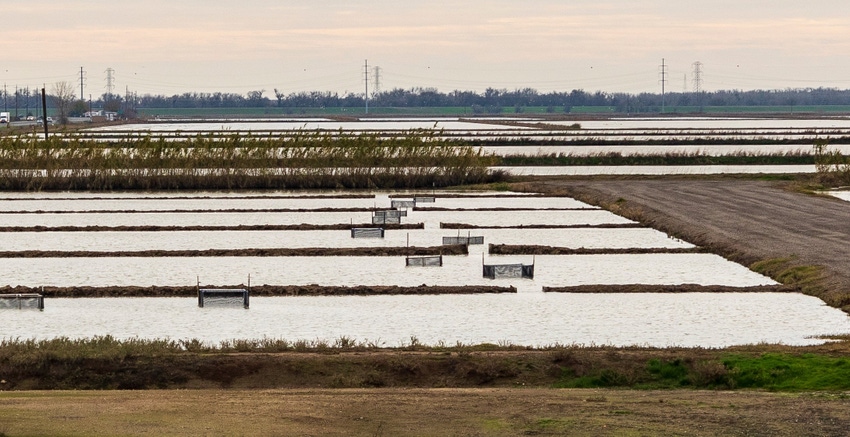
Waterfowl and flooded rice fields have long been understood to be a natural fit. Now scientists believe that juvenile salmon may likewise benefit from the same winter habitat rice farmers provide their feathered friends.
Andrew Rypel is a fish biologist with the University of California. In a collaborative effort between the California Rice Commission and California Trout, Rypel and others are looking at how salmon can benefit from flooded rice fields and associated Sacramento Valley flood plains during the winter months.
"Before I came here there had been some pilot work to look at whether salmon grew well in rice fields, and lo and behold, it seemed like they did," Rypel said.
Baby salmon are being reared in protective structures at Montna Farms, River Garden Farms and elsewhere in Sacramento Valley rice fields to gauge how they can benefit from the zooplankton in the flooded winter rice fields. The naturally occurring food source is a rich source of nutrients for the fingerling fish.
The studies include tagging the fingerling salmon – these are fish anywhere from 40-80 millimeters in length – with small tracking devices to track them as they move from the flood plains with just a few inches of water, to the deeper river channel and ultimately the Pacific Ocean.
"The number of zooplankton these fields can produce is astounding," Rypel says. "That's what they eat and is what makes them grow so fast."
Mortality rates of the juvenile salmon in the Sacramento and Feather rivers is high, he said. In a good year with ample flood flows, Rypel says about 20% of the fish born in the northern California rivers can be expected to survive their trek to the Pacific Ocean. Those numbers dwindle to between zero and 3% in a drought year.
Projects under way use protective cages in rice fields to rear the juvenile fish before releasing them to the river systems. The thought is if rice fields can be managed in the winter as part of the greater flood plains in the Sacramento Valley, the benefits to salmon and overall river health could be great. Managed and controlled floods of the natural flood plains in the valley are seen to bring life back to river systems forever changed by dams and levees.
Aside from the nutrient-rich food sources these fields harbor for juvenile fish, the managed habitat of the shallow water – about four inches deep – coupled with the cooler winter temperatures and wind that oxygenates the water are all important for the developing fish. Predation by birds is low, he said, and the warm-water species of predatory fish common to the Delta region are not present in those fields.
The goal is to grow the fish big and fast before they migrate to the deeper river channels and ocean. Size and overall health are critical to their survival once they reach those areas.
"We don't have those natural flood plains left anymore, but we do have 500,000 acres of rice which could provide surrogate benefits to what those wetlands once provided," Rypel continued.
The studies are funded in part by the Natural Resources Conservation Service (NRCS), which he said is keenly interested in the potential for a practice standard that can be implemented across a wider area.
About the Author(s)
You May Also Like






